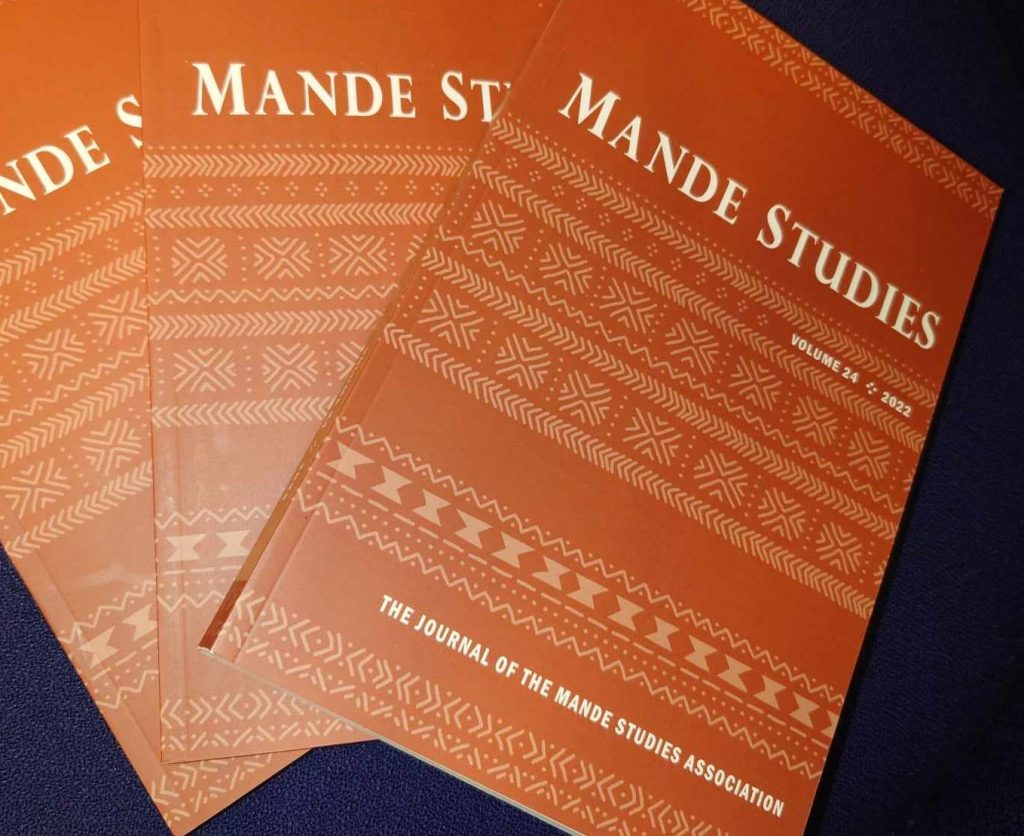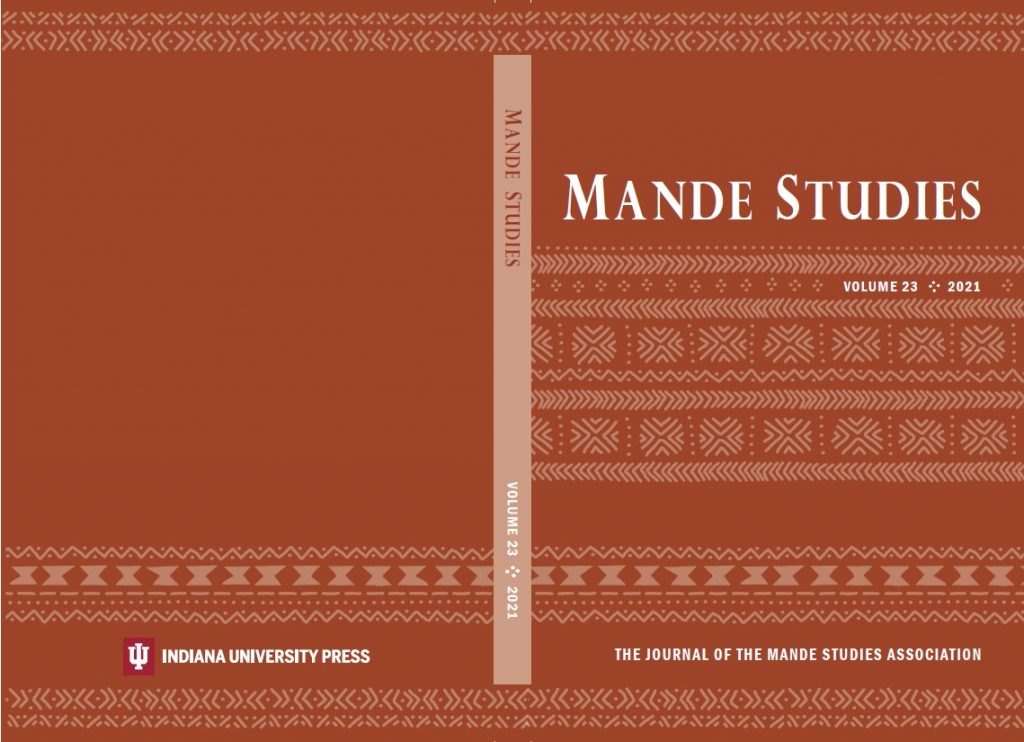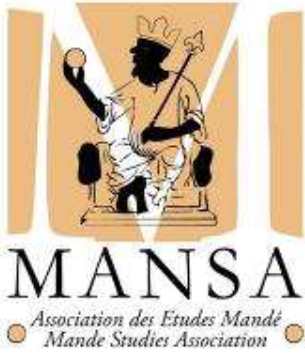Mande Studies: Journal of the Mande Studies Association

Introduction by the Coeditors in Chief
Patrick Royer, Joseph Hellweg
pp. 3-6
DOI: https://doi.org/10.2979/mnd.00011
Introduction: Médiatisation et gatekeeping dans un contexte d'insécurité au Sahel
Heidi Bojsen, Ismaël Compaoré, Éric K. Hahonou, Ludovic O. Kibora, Teke Ngomba, Lassané Yaméogo
pp. 9-25
DOI: https://doi.org/10.2979/mnd.00012
Mediatization, Gatekeeping, and Insecurity in the Sahel: Introduction
Heidi Bojsen, Ismaël Compaoré, Éric K. Hahonou, Ludovic O. Kibora, Teke Ngomba, Lassané Yaméogo
pp. 27-42
DOI: https://doi.org/10.2979/mnd.00013
Médiatisation et conceptualisations écologiques de gatekeeping dans un contexte d'insécurité: Le cas des animateurs des radios communautaires au Sahel
Heidi Bojsen, Ismaël Compaoré
pp. 43-70
DOI: https://doi.org/10.2979/mnd.00014 Introduction by the Coeditors in Chief
Patrick Royer, Joseph Hellweg
pp. 3-6
DOI: https://doi.org/10.2979/mnd.00011
Introduction: Médiatisation et gatekeeping dans un contexte d'insécurité au Sahel
Heidi Bojsen, Ismaël Compaoré, Éric K. Hahonou, Ludovic O. Kibora, Teke Ngomba, Lassané Yaméogo
pp. 9-25
DOI: https://doi.org/10.2979/mnd.00012
Mediatization, Gatekeeping, and Insecurity in the Sahel: Introduction
Heidi Bojsen, Ismaël Compaoré, Éric K. Hahonou, Ludovic O. Kibora, Teke Ngomba, Lassané Yaméogo
pp. 27-42
DOI: https://doi.org/10.2979/mnd.00013
Médiatisation et conceptualisations écologiques de gatekeeping dans un contexte d'insécurité: Le cas des animateurs des radios communautaires au Sahel
Heidi Bojsen, Ismaël Compaoré
pp. 43-70
DOI: https://doi.org/10.2979/mnd.00014
Les radios communautaires au Burkina Faso face à la crise sécuritaire : Contraintes, adaptations et résiliences
Esther Delwendé Konsimbo, Boukari Ouédraogo
pp. 71-87
DOI: https://doi.org/10.2979/mnd.00015
Médias locaux et djihadistes à Madjoari (Est du Burkina Faso) : Cas des radios Tin Tua et la RTB-2
Marcel Bagaré
pp. 89-110
DOI: https://doi.org/10.2979/mnd.00016
Analyse des stratégies de gatekeeping mises en place dans le cadre du Programme d'Éducation par la Radio au profit des élèves déplacés internes au Burkina Faso
Amado Kabore
pp. 111-132
DOI: https://doi.org/10.2979/mnd.00017
Renforcement des capacités des journalistes dans les pays du Sahel en vue d'un « journalisme de précaution »
Souleymane Lamine
pp. 133-155
DOI: https://doi.org/10.2979/mnd.00018
Gatekeeping et dynamique de circulation des informations virales et toxiques: Une étude de deux groupes WhatsApp en Côte d'Ivoire
Waliyu Karimu
pp. 157-172
DOI: https://doi.org/10.2979/mnd.00019
The gated, the gatekeepers and the 'gatekeeper state' : Une approche par le bas du problème de la circulation des personnes et des biens au sein de la CEDEAO
Eric Komlavi Hahonou
pp. 173-194
DOI: https://doi.org/10.2979/mnd.00020
In memoriam: The Sublime Polyphony in the Life and Music of Toumani Diabaté (August 10, 1965, Mali – July 19, 2024, Mali)
Lucy Durán
pp. 197-207
DOI: https://doi.org/10.2979/mnd.00022
Conference Conundrums: The 2024 MANSA Bamako Colloquium, Climate Coloniality, and the Complexities of Virtual Attendance
William G. Moseley
pp. 211-218
DOI: https://doi.org/10.2979/mnd.00023
Critique de la raison animiste by Jean-Loup Amselle (review)
Ahmadou Siendou Konaté
pp. 221-226
DOI: https://doi.org/10.2979/mnd.00024
L'État de Segu et ses chefferies aux XVIIIe et XIXe siècles. Côté cour, côté jardin by Moussa Sow (review)
Patrick Royer
pp. 227-230
DOI: https://doi.org/10.2979/mnd.00025

Introduction by the Editor-In-Chief, Rosa De Jorio
Introduction de la rédactrice en chef, Rosa De Jorio
Dossier: Le Sahel (en)quête de changement : des citoyens qui font face aux crises
Le Sahel (en)quête de changement : Des citoyens qui font face aux crises
Sten Hagberg, Ludovic Ouhonyioué Kibora
Pugsadba : ces figures invisibles du leadership féminin et jeune chez les Moose (Burkina Faso.)
Adjara Konkobo
« Vérité et Justice ! » : Commémoration collective et mobilisation sociale au Burkina Faso
Sten Hagberg
Interdiction de l’exploitation d’or par drague : Une politique publique à l’épreuve des pratiques clandestines par temps de crise
N’gna Traoré, Bintou Koné, Oumar Sidibé, Sékou Camara
Pratiques culturelles et rituelles par temps de crise sécuritaire : la pêche collective de Markala, Mali
Baba Coulibaly
Une anthropologie au service de la nation : un exemple burkinabé
Ludovic Ouhonyioué Kibora
Book Review
Jeliya at the Crossroads: Learning African Wisdom through an Embodied Practice by Lisa Feder (review Bruce Whitehouse)

Introduction by the Editor-in-Chief
Rosa De Jorio
Dossier: Contestation over the Mining Boom in Africa
Introduction: Contestation over the Mining Boom in Africa
Bettina Engels
Rapports de genre dans la chaîne opératoire de l'or sur les sites aurifères du Sud-Ouest du Burkina Faso
Alizèta Ouédraogo
L'extraction minière dans un contexte d'(in)sécurité en Afrique de l'Ouest—boom ou bust?
Diana Ayeh, Tongnoma Zongo, Jacqueline Sow
Epilogue: Gold Mining and State Power: The Violent Frontiers of New Social Formations
Patrick Royer
General Articles
Du Wagadu au Kaabu : le puits, symbole de la fondation, légitimation et destitution du pouvoir au Sahel du VIIIe au XIXe siècles
Mamadou Lamine Sané, Monica Cecilia Labonia
Marchés de terres en Côte d'Ivoire, entre localité et Etat, monétarisation et non monétarisation : ethnographie des arrangements fonciers ruraux chez les groupes mandé de Côte d'Ivoire
Honneo Gabin Tarrouth, Guy Oscar Sical Toukpo
« Avant ce sont les coqs qui chantaient, Désormais les poules ont commencé à chanter. » La participation grandissante des femmes aux dépenses et aux rituels funéraires parmi les Gouro de Côte d'Ivoire
Akissi Amandine Konan, Bouhi Sylvestre Tchanbi, Kando Amédée Soumahoro
"To be Fula Is to Be Noble and Proud": How Pulaaku and Contemporary Social Media Are Shaping Diasporic Fula Identity
Dougoukolo Alpha Oumar Ba Konare, Joseph Hellweg
Pluri-nuptialité et changement social à Bamako: Vers une polygamie durable?
Bruce Whitehouse
Special Feature: Critical Collecting & Participatory Archiving: Alternative Visions for Managing Cultural Resources between Global South and North
Introduction: Critical Collecting & Participatory Archiving: Alternative Visions for Managing Cultural Resources between Global South and North
Rosa De Jorio, Joseph Hellweg
Mapping Senufo: Process, Collaboration, and Generous Thinking
Susan Elizabeth Gagliardi
Photographic Images: The Ethical Challenges of Digitizing and Sharing Mande Visual Resources
Barbara E. Frank, Joseye Tienro
The Facebook Archives of Timbuktu: Preserving Cultural Heritage Online and Reimagining a City's Future
Rosa De Jorio
Song as Archive: The Ethics of Collaboration & Poetics of Dozo Narrative in the Art of Dramane Coulibaly
Joseph Hellweg, Dramane Coulibaly, Drissa Kone
Book Reviews
Review of Frédérick Madore "Islam Burkina Faso Collection" (review), Vincent Hiribarren
A Ritual Geology: Gold and Subterranean Knowledge in Savanna West Africa by Robyn d'Avignon (review), Bruce Whitehouse

Volume 23, 2021
Introduction by the Editor-in-Chief
Rosa de Jorio
Dossier: Soundjata at Sixty: In Memory of Djibril Tamsir Niane
Introduction
Ryan Thomas Skinner
Merging with History Early and Late: Challenging Times for D.T. Niane
David C. Conrad
Djibril Tamsir Niane and the writing of Soundjata: The Inventor of Origins, Between History and Literature
Elara Bertho
The Makings of a Classic: Literary Precursors, Textual Strategies, and Political Purposes in Niane’s Soundjata
Stephen P.D. Bulman
Orality Revisited
Stephen Belcher
General Articles
Dress, Social Change, and the (Re)Construction of Identity in Guinea (Nineteenth Century to Present)
Saidou Mohamed N’Daou
Corps cynégétique – corps possédé : la production rituelle des « sujets virtuoses »
Agnieszka Kedzierska-Manzon
Special Feature: New Mandates for Mande Studies? Reimagining Research, Culture, and Collaboration in West Africa and Its Diasporas
Introduction
Joseph Hellweg
Identities, Histories, and Challenges of (Re)Naming
Maria Grosz-Ngaté
The Future of Mande Studies: Views from the Literary
Alioune Sow
What Is in a Name?
Susan Elizabeth Gagliardi
Rethinking Mande Studies with Shaka Bagayogo: Imagining Post-National Futures in West Africa
Rosa de Jorio
Reckoning Mande: The Politics of Ethnic and Academic Identity in West Africa and Beyond
Joseph Hellweg
Book Reviews
Armelle Faure. Révolution et sorcellerie : une ethnologue au Burkina Faso
(Marcia Tiede)
Dorothea E. Schulz. Political Legitimacy in Postcolonial Mali
(Bruce Whitehouse)
Volume 22, 2020
Introduction by the Editor-in-Chief
Rosa de Jorio
General Articles
Les grandes figures féminines de la société moaaga au Burkina Faso
Lydia Rouamba
Building Benkadi: The Role of Trust in Malian Women’s Community Savings Groups
Tara F. Deubel and Micah Boyer
“You can glorify your daughter in her song”: Exploring Musical Narratives of Gassuus Initiates
Elizabeth Rosner
Je suis sañse rëkk, mais auma xaalis (I’m dressed up, but I don’t have money): Pretense, Camouflage, and the Search for a Lifestyle by Young Men in Pikine, Sénégal
Sebastian Prothmann
“The World Began with Farming”: Creativity and Resilience in West African Savanna Agriculture
Stephen Wooten
Le conflit foncier entre les Guébié et les Lobi a Gnagbodougnoa (Gagnoa) en Côte d’Ivoire de 2000 à 2015
Noël Okobé Datro
“Paka constitution:” Le pragmatisme des représentants de l’État burkinabè dans la gestion des conflits locaux
Yacouba Cissao
L’usage politique de l’islam au Mali
Boubacar Haidara
Special Feature on Chérif Keïta
Introduction
Dianna Bell
Chérif Keïta: A Professional Narrative
Dianna Bell
“In the Hunter’s Footsteps: Chérif Keïta – Scholar, Teacher, Griot”
Joseph Hellweg
Honoring the Unflinchingly Positive Chérif Keïta, the Mande World’s Extraordinary Ambassador
William G. Moseley
To Live in a World without Strangers: The Legacy of Professor Cheick Mamadou Chérif Keïta
Bruce Whitehouse
The Hospitality of a Mentor: A Tribute to Chérif Keïta
Ryan T. Skinner
Epilogue: Chérif Keïta in South Africa: A Conversation with Albie Sachs
Dianna Bell
Volume 21, 2019
Foreword by the Editor-in-Chief
Rosa de Jorio
Dossier: Même pas peur! Ethnographies of Security in the Sahel
Introduction: Même pas peur! Ethnographies of Security in the Sahel
Rosa de Jorio and Sten Hagberg
Ethnography in/of the Red Zone: Challenges, Frustrations and Engagements
Sten Hagberg
Conflict-Related Gender-Based Violence in Mali and the Limits of the Global System of Law
Rosa de Jorio
Réactions populaires aux attaques terroristes de janvier 2016 à Ouagadougou
Ludovic Ouhonyioué Kibora
La commune rurale à l’épreuve : Des maires face aux insécurités multiples au Mali
Bintou Koné et Sten Hagberg
Enquête anthropologique et documentation visuelle sur la sécurité chez les Koglweogo au Burkina Faso
Heidi Bojsen et Ismaël Compaoré
Faillite sécuritaire de l’État et résistance citoyenne au Mali
Yaouaga Félix Koné
General Articles
The Seat of Drought: Religious Thought and the Sahelian Famine (1968-74) in Mali, West Africa
Dianna Bell
Negotiating National Identity and Local Belonging in Contemporary Liberia
Maarten Bedert
Research Notes
Environmental Change and the Cashew Sector: A Case Study in Manding-speaking Côte d’Ivoire
Alfredo Rojas, Colin Thor West, Joseph Hellweg, Philip McDaniel, and Aaron Moody
About Mande Studies
Mande Studies (ISSN 1536-5506, E-ISSN 2379-5506) is published annually by Indiana University Press on behalf of its sponsor, the Mande Studies Association.
Our interdisciplinary journal publishes original research that focuses on the Mande-speaking peoples of West Africa and the Mande community in diaspora, from slavery to the post-colony. Mande Studies is one of the very few US publications with contributions in both French and English. It is also the voice and the point of encounter of a multiplicity of scholars from diverse scholarly traditions, as it brings together North American, European, and African scholars. We welcome articles in the social sciences and the humanities including, but not limited to: history, art history, archeology, sociology, and public health.
Editorial Team
- Editors-in-Chief
- Joseph Hellweg (Florida State University), jhellweg@fsu.edu
- Patrick Royer (Rensselaer Polytechnic Institute), patroyer64@gmail.com
- Editors
- Rosa de Jorio (University of North Florida) rdejorio@unf.edu
- Alioune Sow (University of Florida), sow@ufl.edu
- Bruce Whitehouse (Lehigh University), bruce.whitehouse@lehigh.edu
Managing Editor
• Jesse Miller, jcmiller2@fsu.edu
Editorial Board
• Stephen Belcher
• Alicia Bellagamba
• David Conrad
• Drissa Diakité
• Mamadou Diawara
• Odile Georg
• Alma Gottlieb
• Sten Hagberg
• Walter Hawthorne
• Joseph Hellweg
• Barbara Hoffman
• José da Silva Horta
• Martin Klein
• Christoph Kohl
• Kassim Koné
• Robert Launay
• Peter Mark
• Wilson Trajano Filho
Submission Guidelines
Mande Studies (ISSN 1536-5506, E-ISSN 2379-5506) is published annually by Indiana University Press on behalf of its sponsor, the Mande Studies Association.
Style guide and submission guidelines:
Style guide and submission guidelines
Instructions pour les auteurs
Back issues on JSTOR
Subscriptions
SUBSCRIPTION RATES
- Individuals: $20 (print), $18.50 (electronic), $25 (print and electronic – included in all membership categories).
- Institutions: $45 (print), $50 (electronic), $55 (print and electronic) Foreign postage: add $8/year (airmail)
- ORDERING INFORMATION
- For non-members, order subscriptions or single issues online from JSTOR at http://www.jstor.org/r/iupress or call 1-888-388-3574 (individuals) or 1-877-786-7575 (institutions). Print single issues, back issues, and bulk orders may be ordered directly from Indiana University Press by phone at 1-800-842-6796/1-812-855-8817; by fax at 1-812-855-7931; or by email at iuporder@indiana .edu. Please notify Indiana University Press of any change of postal or email address. Print issues missed because of outdated addresses will not be replaced free of charge.
